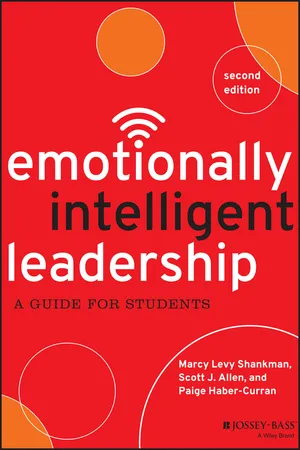
Emotionally Intelligent Leadership
A Guide for Students
- English
- ePUB (mobile friendly)
- Available on iOS & Android
Emotionally Intelligent Leadership
A Guide for Students
About this book
The only book for students which explores the connection between emotional intelligence and effective leadership
Emotionally Intelligent Leadership: A Guide for Students is based on a conceptual model that helps students to become emotionally intelligent leaders. Research from around the world has demonstrated that there is a relationship between emotional intelligence and leadership. For the second edition of Emotionally Intelligent Leadership, the authors have incorporated their revised, data-based emotionally intelligent leadership (EIL) model into an engaging text for high school, undergraduate, and graduate students.
The book can be used in conjunction with the Emotionally Intelligent Leadership for Students Inventory and Student Workbook for an immersive and transformative educational experience. Students will appreciate the opportunity to learn more about themselves as they reflect on their experiences as learners and their own leadership journeys.
- The new edition is substantially rewritten based new research on the EIL model
- Its clear structure is organized around the three facets of emotionally intelligent leadership and 19 leadership capacities
- Questions at the end of each chapter encourage purposeful reflection and leadership growth
Emotionally Intelligent Leadership is one of a kind, fostering growth and promoting intense self-reflection. Students are empowered to enhance the campus experience and develop into effective leaders of the future. Emotionally Intelligent Leadership is the perfect introduction to leading with emotional intelligence.
Frequently asked questions
- Essential is ideal for learners and professionals who enjoy exploring a wide range of subjects. Access the Essential Library with 800,000+ trusted titles and best-sellers across business, personal growth, and the humanities. Includes unlimited reading time and Standard Read Aloud voice.
- Complete: Perfect for advanced learners and researchers needing full, unrestricted access. Unlock 1.4M+ books across hundreds of subjects, including academic and specialized titles. The Complete Plan also includes advanced features like Premium Read Aloud and Research Assistant.
Please note we cannot support devices running on iOS 13 and Android 7 or earlier. Learn more about using the app.
Information
Chapter 1
Introduction
You Are in the Right Place
- someone who continually works at the “edge” of your abilities;
- someone who is acutely in tune with your values and acts on them;
- someone who intentionally practices leadership on and off campus;
- someone who reflects and consistently looks inward as a way to develop and grow;
- someone who is open to giving and receiving feedback;
- someone who develops relationships with ease and builds coalitions;
- someone who is inclusive;
- someone who can work through differences;
- someone who is just as skilled at following as leading; and
- someone whom others look to as a role model and guide.
Our Ten Truths about Leadership
- Leadership is art and science. Like any other domain of knowledge and practice (e.g., medicine, law, engineering), volumes of academic research have been written on what it means to be an effective leader (the science). However, this research has not resulted in a simple formula of effective leadership. It does not exist. To become a great leader, we must realize that there is uncertainty, there are a range of contexts, and thus, there is an art to leadership as well. In reality, great leaders know when to rely on the research (science) and when to improvise (art) to blaze a new trail.
- Leadership can be learned and developed. The notion that one must be born a leader and that people cannot grow and develop leadership capacity is an archaic way of thinking. In fact, research conducted on twins found that as much as 70 percent of leadership is learned (Arvey, Rotundo, Johnson, Zhang, & McGue, 2006). This research suggests that people may be born with some genetic predispositions that may help them more easily engage in leadership (e.g., extraversion, stamina), but the role of the environment is undeniable. From personal experience, we know that through hard work, we have improved our own capacity to lead. And we have worked with students who, through their own hard work and attention, have developed their capacity to lead others as well.
- Leadership ...
Table of contents
- Cover
- Praise for Emotionally Intelligent Leadership for Students: A Guide for Students, Second Edition
- Title Page
- Copyright
- Foreword: It's All about Relationships
- Acknowledgments
- Dedication
- About the Authors
- Chapter 1: Introduction
- Part One: Consciousness of Self
- Part Two: Consciousness of Others
- Part Three: Consciousness of Context
- Appendix EIL Overview
- More from Wiley
- Index
- End User License Agreement